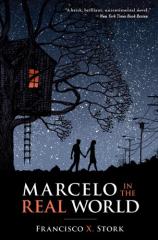Marcelo in the Real World
Review
Marcelo in the Real World
There are many elements to Francisco X. Stork’s newest book, MARCELO IN THE REAL WORLD, that deserve readers’ --- and this critic’s --- praise. Much like Mark Haddon did in his highly acclaimed first novel, THE CURIOUS INCIDENT OF THE DOG IN THE NIGHT-TIME, Stork takes a delicate subject matter --- life in the “real world” as a 17-year-old boy with Asperger’s syndrome --- and infuses it with startling beauty and authenticity.
Although the novel is written in the first-person perspective, Stork’s protagonist, Marcelo Sandoval, often refers to himself in the third person, a technique that might have sounded clichéd or forced in a less capable writer’s hands. Instead, Stork incorporates Marcelo’s broken yet determined cadence into the plot naturally, enabling readers to feel both close to and alienated from Marcelo’s thoughts in all the appropriate moments, just as we might experience when talking to him in “real” life. At no point will readers feel alienated by Marcelo’s bluntness, his cumbersome way of speaking, his black-and-white point of view. In fact, it is precisely these details that make his story --- and his growth as a character --- such a poignant journey.
When Stork first introduces Marcelo, he is a shy and ultimately private young man. He attends Paterson, a private school for kids with “special needs,” and lives in a heated tree house in his parents’ backyard. Unlike most boys his age, he prefers discussing religion rather than girls and would choose his cherished philosophical powwows with a female rabbi (although he’s not Jewish) over hanging out with friends any day (not that he has many). He spends hours thinking about music (both in the outside world and in his head) and covets time spent alone with his thoughts. In short, Marcelo is a recluse, by condition and by choice --- that is, until his high-powered father forces him to work in the mailroom at his hoity-toity law firm over the summer, so that Marcelo can see what it’s like to function like a “normal” person.
As can be expected, Marcelo’s life begins to change as he spends more and more time at the firm. City noises at loud volumes become less alien to him. The constant music he hears inside his head begins to wane. And social interactions --- and why people say or do the things they say or do --- become increasingly confusing. Before long, Marcelo is faced with a number of hard questions he never knew were possible: Is Wendell, the smarmy chauvinistic son of his father’s partner, a friend, or is he taking advantage of Marcelo for his own gain? What does it mean to be attracted to a woman sexually, and does he feel that way about Jasmine, his mailroom boss? What is the nature of right and wrong, and is it better to do what’s right (i.e. blowing the whistle about something he learns while researching one of his father’s top clients), even though he might hurt someone he loves?
Like many a person with Asperger’s might, Marcelo has a tough time forging his way in these unfamiliar surroundings. But no one can fault him for not trying. His burgeoning friendship-bordering-on-relationship with Jasmine feels miraculous yet true, and readers will root for their union not for the usual reasons (she’s “hot,” he deserves a girlfriend, it’ll be fun), but because the two have a rare and beautiful (and chaste!) connection not often seen --- or felt --- in young adult literature these days.
At the novel’s closing, the future looks brighter for Marcelo, and some might attribute it to his learning how to “deal” and act “normal” in the real world, thanks to his bossy father’s nudging. Yes, there’s an element of truth to that, but there’s also something to be said about Marcelo’s willingness to stick-it-to what’s wrong in that world no matter what the cost. And while MARCELO IN THE REAL WORLD verges into “underdog with a heart of gold who triumphs over his own suffering” territory possibly too frequently for some readers’ tastes (especially those with personal, not-so-rosy experiences with Asperger’s), there’s nothing wrong with believing that anything is possible no matter who you are. Even skeptics will root for Marcelo (and Truth) in the end.
Reviewed by Alexis Burling on February 1, 2011
Marcelo in the Real World
- Publication Date: February 1, 2011
- Genres: Fiction, Young Adult 12+
- Paperback: 320 pages
- Publisher: Scholastic Paperbacks
- ISBN-10: 054505690X
- ISBN-13: 9780545056908





